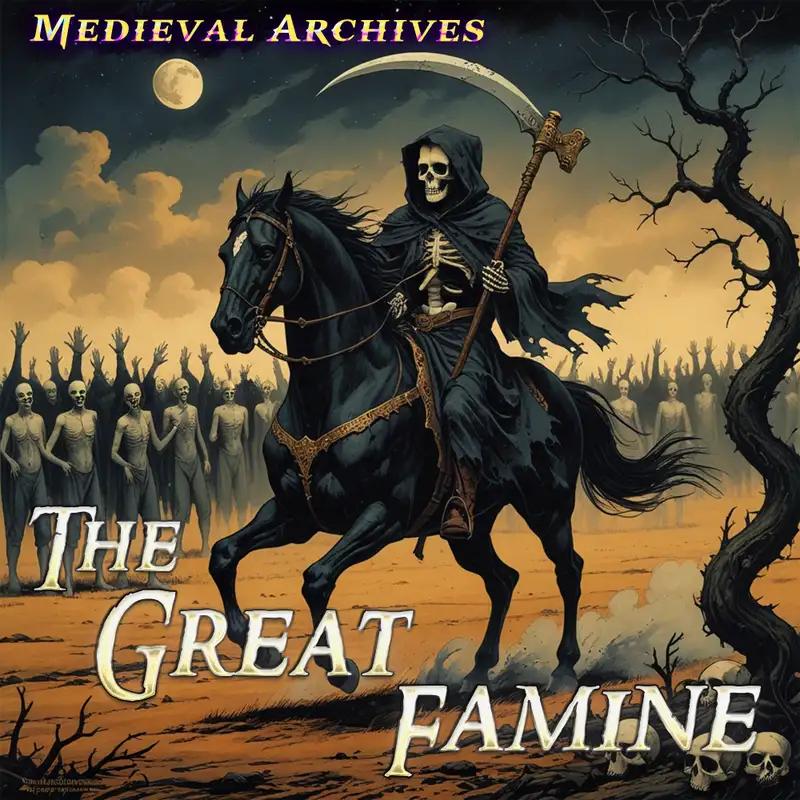- Medieval Archives
- Posts
- Hunger Games: The Great Famine of 1315
Hunger Games: The Great Famine of 1315
The Great Famine of 1315-1317
🌾Hunger Games: The Great Famine of 1315🌾

The Great Famine 1315-1317
“When God saw that the world was so over proud, He sent a dearth on earth, and made it full hard...”
In this episode, we journey back to the start of the 14th century to explore how a period of prosperity and growth in medieval Europe suddenly transitioned into depression, famine, and death.
The 14th century begins a 200-year era known as the Crisis of the Late Middle Ages, characterized by famine, plague, religious schisms, and numerous wars. We focus on the event that started it all: the Great Famine of 1315
Leading up to the 14th century was a time prosperity and abundance. Europe was densely populated and highly dependent on agriculture.
For centuries, since around the year 1000, Europe enjoyed a relatively warm and stable climate, a period we now call the Medieval Warm Period.
That all changed in the 14th century when Europe entered the “Little Ice Age.” A 400 year period of global cooling.
In 1315 Spring brought prolonged rain, carrying over into the Summer. Farmland was saturated, crops failed and livestock was wiped out. It was truly an end of the world apocalypse.
The show is stronger with your support and sustaining donations.
The favorite is the $10.66 Norman Invasion donation.
There’s also the $14.85 Battle of Bosworth donation.
And there’s always the do-it-yourself open donation.
Discover how volcanic eruptions may have triggered the cooling known as the Little Ice Age, why salt shortages made survival impossible, and how desperate people turned to unthinkable acts. From chroniclers’ grim accounts to the real-life origins of Hansel and Gretel, this is a chilling story of hunger, hope, and humanity on the brink.
The Great Famine of 1315–1317 marked the first great crisis of the Late Middle Ages. For three years, unrelenting rain, crop failure, disease, and starvation devastated Europe. It was the end of the Medieval Warm Period and the dawn of the Little Ice Age, a chilling prelude to the horrors of the Black Death three decades later.
Get all the links and see the bibliography in the show notes on Medieval Archives!
Grab a free copy of A Distant Mirror: The Calamitous Fourteenth Century by Barbara W. Tuchman
Other episodes mentioned in this episode:
Ep. 42 - Medieval Diseases and “Cures”
Ep. 75 - Natural Disasters: Earthquakes that rocked the Middle Ages
When he opened the third seal, I heard the third living creature say, "Come!" And I looked, and behold, a black horse! And its rider had a pair of scales in his hand.
And I heard what seemed to be a voice in the midst of the four living creatures, saying, "A quart of wheat for a denarius, and three quarts of barley for a denarius, and do not harm the oil and wine!"
Bibliography (Great books for further reading!)
Bartlett, Robert. 1994. The Making of Europe: Conquest, Colonization, and Cultural Change, 950–1350. Princeton University Press.
Rosen, William. 2014. The Third Horseman: Climate Change and the Great Famine of the 14th Century. Penguin Publishing Group.
Tuchman, Barbara Wertheim. 1979. A Distant Mirror: The Calamitous 14th Century. Ballantine.
Medieval Archives and Medieval Tales is an independently owned and operated podcast. There are no universities or corporations peddling their influence over the show or topics discussed. The show is support by you, our wonderful producers.
Medieval Archives is dedicated to remain AD free!
Thank you for your support!
This is a video of the Hunga Tonga volcano eruption which I mention in the episode
The Newsletter contains Affiliate Links. The links are no cost to the user and provide a small amount back to Medieval Archives.

